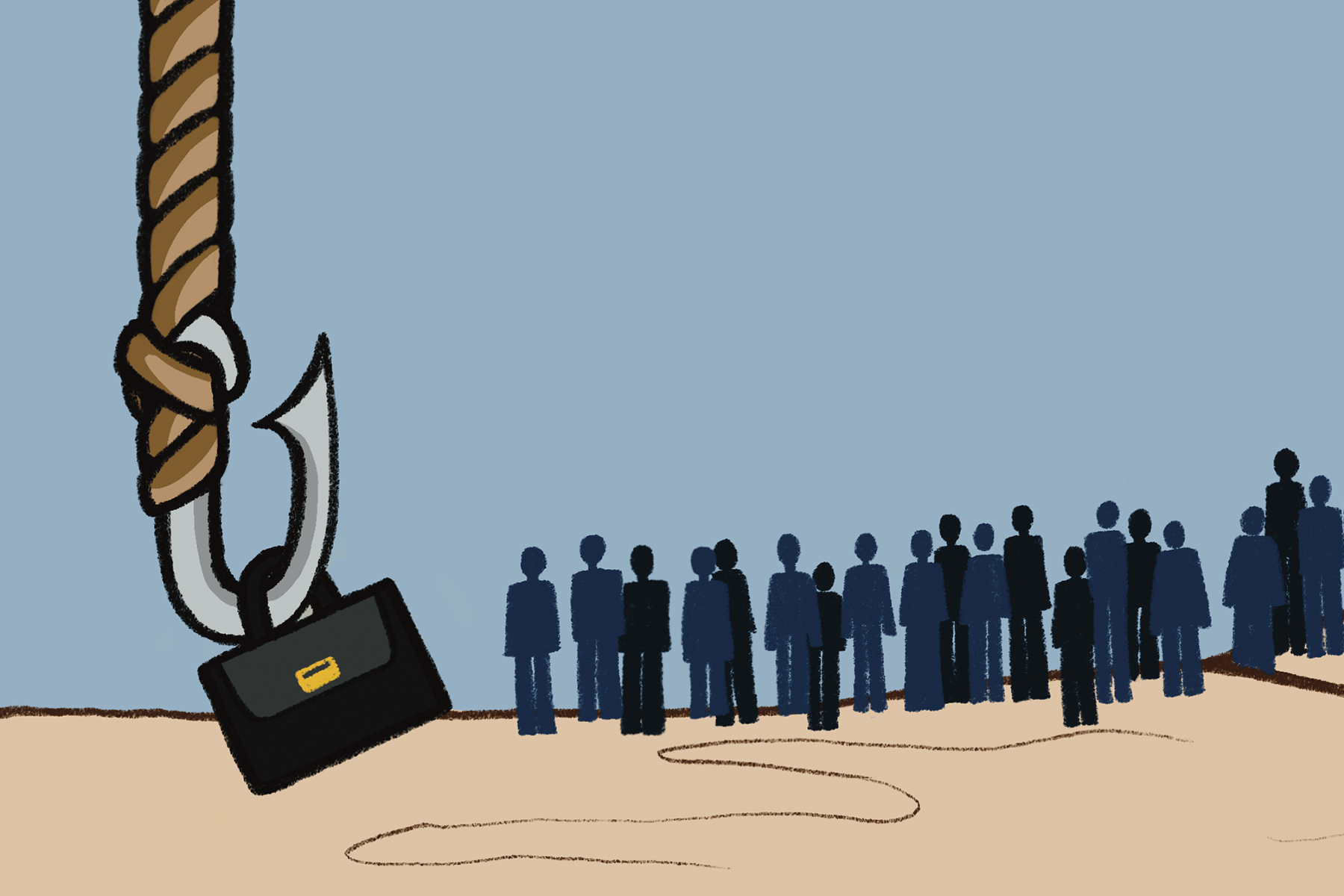For experience’s sake, don’t take the bait
Under the Arch
For experience’s sake, don’t take the bait
Unpaid internships reel in students hungry for experience, enabling cut corners and socioeconomic inequality.
Mia Shou, Deputy Culture Editor | October 23, 2025

There’s an unmistakable feeling of heart-sinking when, after skimming an internship listing that seems to be the perfect fit, you read the dreaded line: “available for college credit.” Pay? Nonexistent. Weekly hours? Far too many. But to fill in those blank gaps on your resume, or to simply just have something after months of rejection, you grit your teeth and accept an unpaid offer with a smile.
This problem has its roots in the fact that students are constantly told something along the lines of “employers look for relevant work experience.” Take, for example, this LinkedIn study that touts that, for the class of 2022, having an internship made students nearly 23% more likely to land a job within six months of graduation than those who never had one.
No reasonable student would refuse increasing their chances of employment, and many thus begin the scramble to fire resumes into the void — yet only two-thirds of internships offer payment to students at four-year institutions, putting those who want both experience and reasonable compensation in a difficult position.
In my three years at NYU, I’ve held three positions, two of which were unpaid. Though my story is just anecdotal, it’s living proof of the unexpected compromises interns are forced to make in our pursuit of the holy grail: experience.
I will gloss over my first unpaid position — at the time, I was working another part-time position that paid my bills. However, this year, I’ve lost that source of income, and am choosing to avoid unpaid internships like the plague.
I’m not the only one. In the same study, 63% of respondents mentioned that they would have liked to intern, but citing reasons like a scarcity of openings and “personal factors,” they ended up forgoing a position.
Though it was not explicitly listed, one common factor is financial insecurity — it’s not breaking news that unpaid internships perpetuate privilege and inequality.
In a 2024 study of United Nations interns conducted by the Fair Internship Initiative, 41% of participants had an unpaid internship that created financial difficulty or affected their living conditions. This figure increased to 59% for those who lacked financial support from their family.
As a result, participants who were unable financially sustain themselves tended to be excluded from unpaid positions, disadvantaged purely on the basis of socioeconomic status. At the same time, the value placed on the internship experience can be understood through how a 2015 U.N. intern slept in a tent to compensate.
In my case, I hoped that I could land a paid internship that would both check the experience box and sustain me. Unsurprisingly, every single application fell through the cracks, leaving me with a last-resort assistant position from the journalism department’s listserv that paid $15 an hour. If I worked 10 hours a week, I thought, $150 per week should cover the bare minimum.
I soon realized I had fallen for a bait-and-switch. My supervisor told me, verbatim, that if she paid me $15 an hour, I would be making too much money, and slashed it to $10 an hour.
The main catch was her temper. Though she had worked for big-name record labels, her experience had only been with a typewriter. She got incredibly frustrated when, for example, a press release contained broken links, resorting to slews of verbal abuse. After enduring a month of this — for which I was never paid — I decided to quit.
Though I no longer work there, those tirades have stayed with me. When I made my first mistake at WSN as an editor, I expected to be berated in a similar way, and was genuinely shocked when I wasn’t. In a way, this, instead of $10 an hour, was my compensation. I went in wanting experience for my resume, and instead, received an experience that changed how I view the workplace.
I’m quite certain that situations like this could be avoided through an increased effort to vet internships — particularly the unpaid ones. Departmental job boards and organizations like Handshake need to do a better job of balancing continuous job postings as a means of maximizing students’ chances of landing one with the need to ensure students’ safety. Handshake could, for example, allow students to rate and review positions they’ve held, like Indeed’s job boards.
Students need to do their part too. In my aforementioned position, I was only the latest NYU student to work there. This means that several others had somehow lasted through my employer’s temper tantrums for an entire semester, and moreover, likely made the conscious decision not to report it. In doing so, they chose to prolong their own misery and reinforced the employer’s belief that verbally abusing underpaid assistants was okay — which, in case it’s still unclear, wasn’t.
By sending my own message out into the void, I hope it resonates with someone in a way my internship applications haven’t. If this essay finds you in a similarly abusive position because you couldn’t land a job at The New York Times or Google or what-have-you, know that there is something you can indeed do. For all the reasons above, get the everloving hell out of there, and report it.
Contact Mia Shou at [email protected].

Mia Shou is a junior double majoring in art history and journalism with a minor in data science. When she’s not panicking about schoolwork, you can find...

Kyra Reilley is a junior studying interactive media arts at Tisch. You can probably find her bouncing between all her clubs or catching the subway to her...
























































































































































